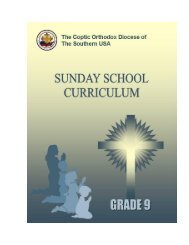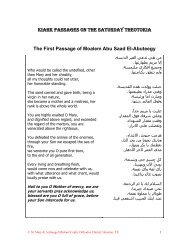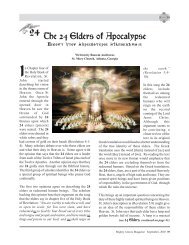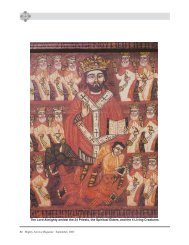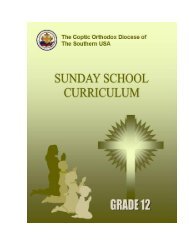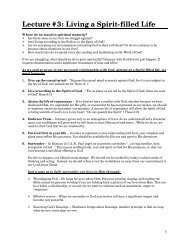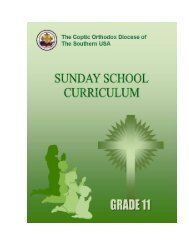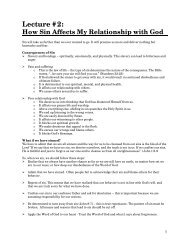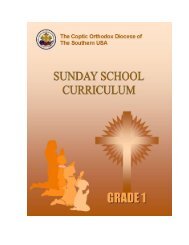Grade 5 - Coptic Orthodox Diocese of the Southern United States
Grade 5 - Coptic Orthodox Diocese of the Southern United States
Grade 5 - Coptic Orthodox Diocese of the Southern United States
Create successful ePaper yourself
Turn your PDF publications into a flip-book with our unique Google optimized e-Paper software.
Sunday School Curriculum <strong>Grade</strong> 5<br />
Demetrius had been a man <strong>of</strong> little learning. When he was chosen Pope, <strong>the</strong> first goal he set<br />
for himself was to seek learning persistently and diligently, and to make himself worthy <strong>of</strong><br />
serving his people. It is said <strong>of</strong> him that he used to sit at <strong>the</strong> feet <strong>of</strong> his teachers saying, ―Let men<br />
seek knowledge with true humility and an ardent desire to learn, forgetful <strong>of</strong> rank or position?‖<br />
As time went on, Demetrius became one <strong>of</strong> <strong>the</strong> most learned <strong>of</strong> prelates -a bright and shining<br />
star in <strong>the</strong> firmament <strong>of</strong> <strong>the</strong> <strong>Coptic</strong> Church which was destined to be filled with shining stars.<br />
One <strong>of</strong> <strong>the</strong> many significant original achievements <strong>of</strong> Anba Demetrius is <strong>the</strong> method he<br />
devised for calculating <strong>the</strong> date <strong>of</strong> Easter so that it would always follow after <strong>the</strong> Jewish<br />
Passover, just like <strong>the</strong> first Easter Sunday, according to <strong>the</strong> historical Biblical events. This<br />
method is known as <strong>the</strong> ―Epact‖, and to this day it is followed by all Eastern <strong>Orthodox</strong> Churches<br />
in determining <strong>the</strong>ir Easter date many years in advance. It involved making a correlation between<br />
<strong>the</strong> lunar Jewish year and <strong>the</strong> solar Egyptian year. This was necessary because <strong>the</strong> lunar year is<br />
shorter than <strong>the</strong> solar year by eleven days, and a fixed date in it can fall in any season as <strong>the</strong><br />
years go by, and would deviate Easter from <strong>the</strong> Passover.<br />
When Anba Demetrius made <strong>the</strong> Epact calculation, he summoned <strong>the</strong> Holy Council, and<br />
explained it to its members. They approved it and decided to abide by it. Many years later, in 325<br />
AD when <strong>the</strong> first Ecumenical Council <strong>of</strong> Nicene met, this calculation was submitted to it, and<br />
again approved unanimously. It continued to be followed by all Christian Churches until 1582<br />
AD when <strong>the</strong> calendar was changed by Pope Gregory XIII <strong>of</strong> Rome. Since <strong>the</strong>n <strong>the</strong> Western<br />
Churches departed from it, and now <strong>the</strong>y observe Easter on <strong>the</strong> first Sunday after <strong>the</strong> full moon<br />
following <strong>the</strong> Vernal equinox, regardless <strong>of</strong> <strong>the</strong> Jewish Passover. The Eastern Churches,<br />
however, still adhere to this old calculation, hence <strong>the</strong> divergence between <strong>the</strong> Eastern and<br />
Western Churches on <strong>the</strong> date <strong>of</strong> Easter celebration.<br />
The first few years after Anba Demetrius had taken <strong>the</strong> helm <strong>of</strong> <strong>the</strong> Church were peaceful<br />
years. Then <strong>the</strong> severe persecutions <strong>of</strong> Emperor Severus broke out, and many staunch believers<br />
were martyred. Among <strong>the</strong>m was St. Leonidas, fa<strong>the</strong>r <strong>of</strong> one <strong>of</strong> <strong>the</strong> most famous figures <strong>of</strong> <strong>the</strong><br />
early Christian Church, Origen. During <strong>the</strong> persecutions, a Roman prefect marched with his<br />
troops into <strong>the</strong> Church <strong>of</strong> St. Mark and robbed it <strong>of</strong> all its holy vessels. Then he seized Anba<br />
Demetrius, and sent him into exile to a town called Wissim, where he remained until <strong>the</strong><br />
persecutions ceased.<br />
On his return to his See, Anba Demetrius learned that Clement, Dean <strong>of</strong> <strong>the</strong> School <strong>of</strong><br />
Alexandria, had gone to his rest. The school was thus in dire need <strong>of</strong> a new Dean to give it a<br />
strong impetus. The Christians <strong>of</strong> <strong>the</strong> city who had been enduring <strong>the</strong> trials and tribulations <strong>of</strong><br />
those hard times, all witnessed <strong>the</strong> great heroism, ardent Christian zeal, and brilliance which<br />
characterized <strong>the</strong> young Origen. Upon hearing <strong>of</strong> this, Anba Demetrius immediately appointed<br />
him Dean <strong>of</strong> <strong>the</strong> school. He was <strong>the</strong>n exceedingly young, only eighteen years old. Never<strong>the</strong>less,<br />
he got <strong>the</strong> appointment because <strong>of</strong> what had been said <strong>of</strong> him.<br />
Origen proved that his Christian devotion and his passionate interest in <strong>the</strong> School more than<br />
made up for his youth. Through his efforts it flourished again, and a period <strong>of</strong> constructive work<br />
followed. The faithful increased in number continually; Anba Demetrius found it necessary to<br />
consecrate several new bishops, to shepherd <strong>the</strong> people and keep <strong>the</strong> lamp <strong>of</strong> <strong>the</strong>ir newly<br />
acquired faith shining bright.<br />
PENTECOST PERIOD 113



